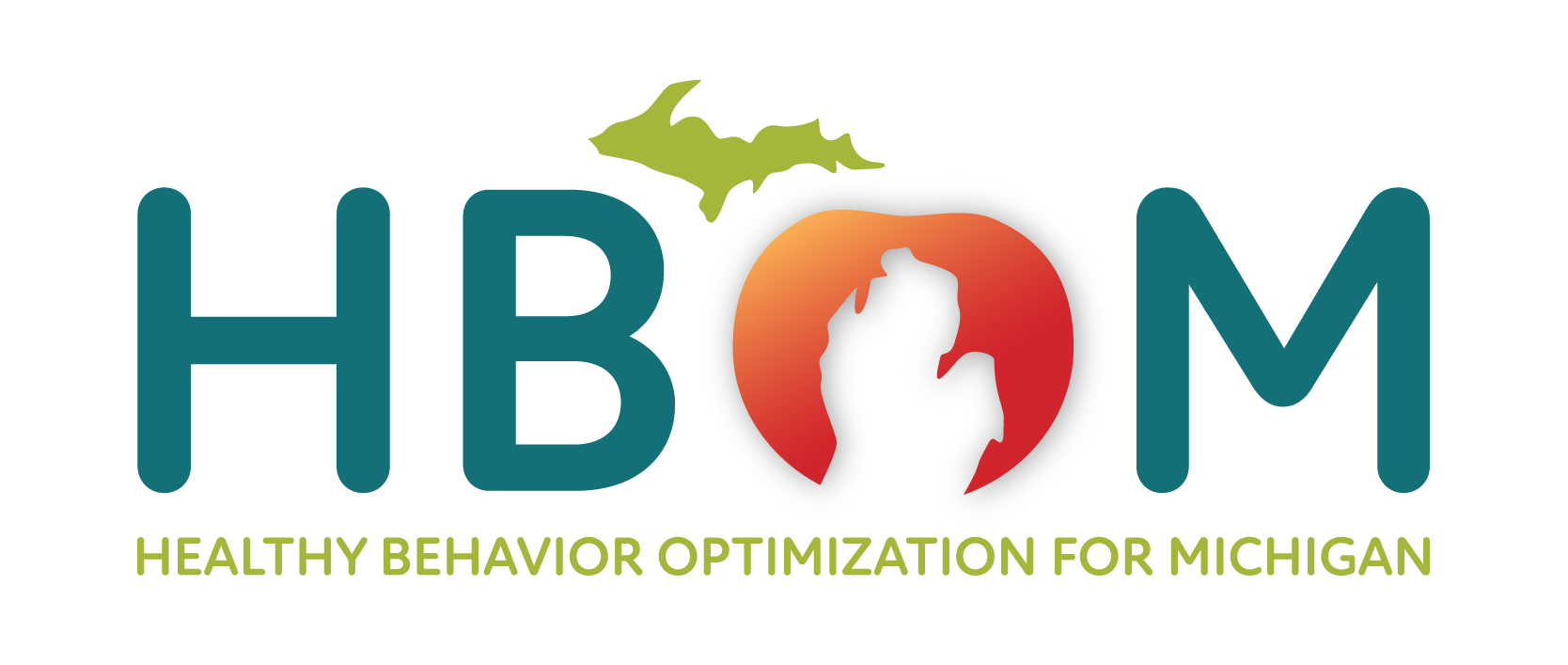
HBOM and MOQC are together again! In 2022, we tackled tobacco cessation together, with some custom tobacco cessation outreach materials designed to reach members of the oncology care community.
Now in 2023-2024, the collaboration is back. Together, we will take a new approach to a persistent problem in cancer care: Malnutrition and food insecurity.
Food insecurity is a critical issue affecting individuals fighting cancer. This pervasive problem exacerbates malnutrition in cancer patients, highlighting the urgent need for support and solutions.
Food Insecurity and Malnutrition in Cancer Care

“It is critical for people who are on a journey with cancer to have access to nutritious foods, as proper nourishment is especially important while our bodies are under stress and trying to heal.
—Keli Devries, LMSW, Michigan Oncology Quality Collaborative (MOQC) Program Manager
Up to 85% of people with cancer experience malnutrition, and malnutrition accounts for 10% to 50% of mortality in people with cancer. Malnutrition also increases the risk of toxicity from anticancer therapy and diminishes the quality of life in people with cancer. Cancer treatments can make it hard for people to eat well and may affect taste, smell, one’s appetite, and one’s ability to eat enough food and absorb nutrients. In addition, food-drug interactions have a substantial impact on the effectiveness of anti-cancer treatment.
People who live in medically underserved areas and/or who have limited financial resources may experience food insecurity. Food insecurity, as defined by USDA, is the limited or uncertain availability of nutritionally adequate and safe foods. The prevalence of food insecurity increases with chronic illness, including cancer, and individuals with cancer are more vulnerable to food insecurity due to factors such as decreased income, reduced employment opportunities, increased medical expenses, and limited social support. Poor nutrition is compounded in populations with low income who often lack access to nutrient-rich foods for a variety of reasons, including financial constraints, limited access to full-service grocery stores, lack of transportation, and lack of knowledge, time, and energy to prepare healthy foods.
A healthy diet and eating habits can help people with cancer maintain a healthy weight, preserve strength, and manage the side effects of their treatment. A healthy diet for people undergoing cancer treatment includes nutrient-dense foods containing vitamins, minerals, protein, carbohydrates, fats, and water that the body requires. A focus on plant-based foods and regular exercise is beneficial. Additionally, nutrition education from a registered dietitian has been shown to help people with cancer live longer.
Addressing food insecurity in the cancer community requires a collaborative effort from various stakeholders including healthcare providers, policymakers, and community organizations. Identification of food insecurity amongst cancer patients can positively affect health outcomes and reduce health disparities amongst historically marginalized groups when paired with effective resources. Steps toward rectifying food insecurity and malnutrition include screening and identification, nutrition education and support, and connecting patients with appropriate resources.
Read Also: MOQC’s Summer 2023 Newsletter
HBOM recommends this MOQC-produced podcast series “Ovarian Cancer Education” and their latest episode on nutrition in cancer care.
A New Joint Program Providing Comforting, Complete Meals During Chemo
HBOM and MOQC are nearing the launch of a pilot project to address malnutrition during chemotherapy for individuals who are food insecure. HBOM and MOQC are bringing in an industry partner—a meal delivery company that excels in delivering nutritious, easy meals, tailored to the unique nutrition needs of cancer patients.
Studies have shown that meal and grocery delivery programs can improve food security in vulnerable people who are medically underserved, food insecure, and at risk of malnutrition, poorer survival, and reduced quality of life. This venture pairs HBOM’s expertise in forging public-private partnerships that optimize healthy behaviors and MOQC’s nearly 15-year commitment to supporting networks of oncology care teams in the improvement of cancer care.
The program will be officially announced next month at MOQC’s fall regional meetings (and we can’t wait)!
More about MOQC

The Michigan Oncology Quality Consortium is a physician-led, voluntary collaborative of medical and gynecologic oncologists who come together to improve the quality and value of cancer care in Michigan. Their purpose is to further the success of interdisciplinary teams that improve the quality and value of cancer care.
MOQC was launched in 2009 and is sponsored by the Value Partnership Program of Blue Cross Blue Shield of Michigan (BCBSM). The CQI works with community and academic oncologists, nurses, pharmacists, nurse practitioners and physician assistants, medical assistants, abstractors, and patients and caregivers to identify areas in which the collaborative can improve quality or value. Since its inception, MOQC has increasingly centered the voice and needs of patients and caregivers, centered equity, increased its focus on value in care, and expanded its reach to all members of the health care teams that care for patients and their loved ones.
Partners in Patient-Centered Care
A note from MOQC Program Manager Keli Devries, LMSW:
“Collaboration among CQIs is vital to healthcare improvement in bringing together community groups, healthcare providers, and other stakeholders to enhance quality care and patient outcomes. The partnership with HBOM has been instrumental in bringing this meal delivery initiative forward. HBOM’s expertise in health behaviors, access to innovative, evidence-based programs and support, along with their creative programming is unparalleled. By working together, we hope to create a sustainable plan that ultimately results in a higher quality of life and better outcomes for patients with cancer who are food insecure.”
“It is critical for people who are on a journey with cancer to have access to nutritious foods, as proper nourishment is especially important while our bodies are under stress and trying to heal. MOQC centers patient and caregiver voices in our decision-making about what projects to prioritize, and we have found great value in collaborating with other CQIs on quality improvement initiatives because we all benefit from a greater diversity of backgrounds, training, and perspectives when we work together to solve problems.”
